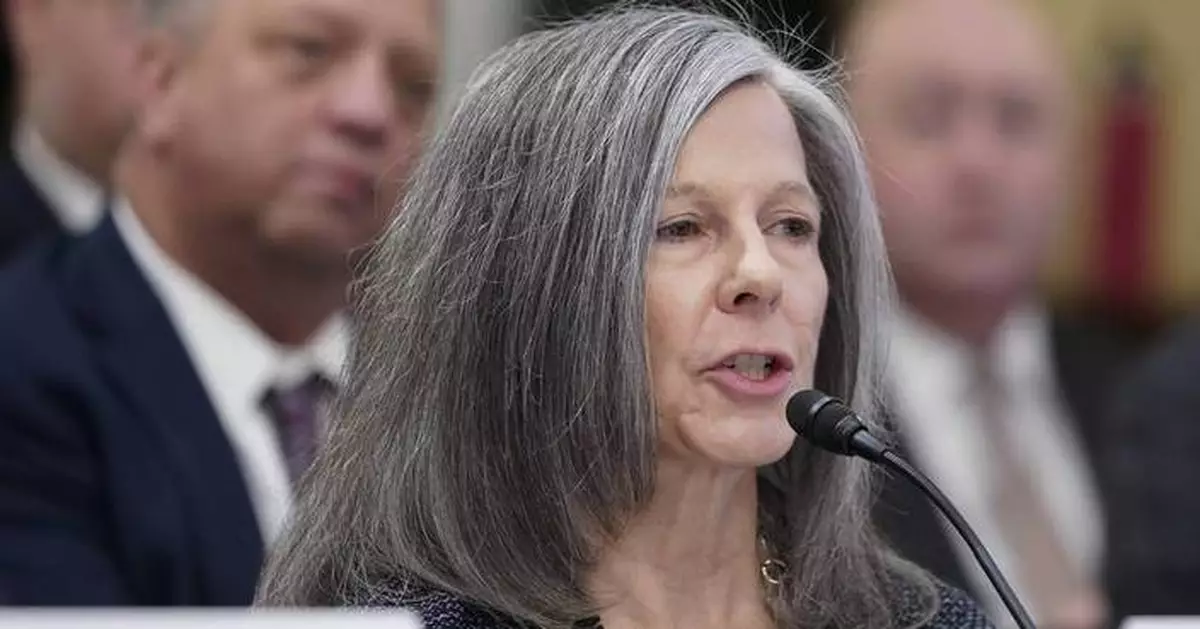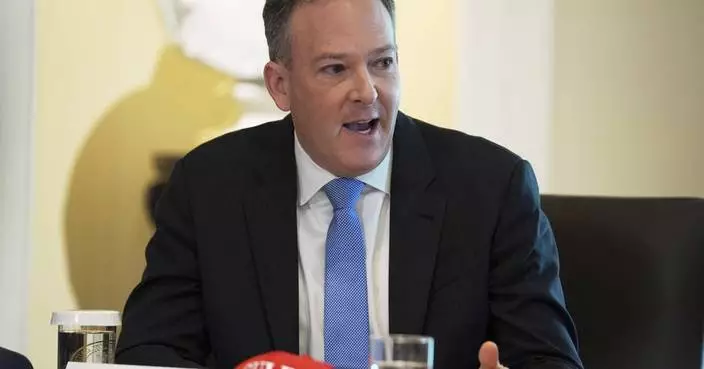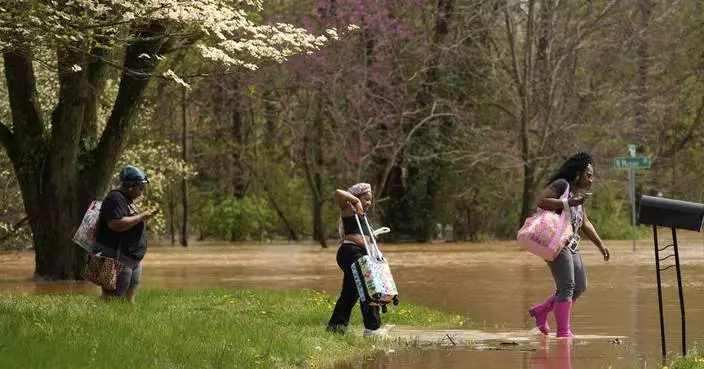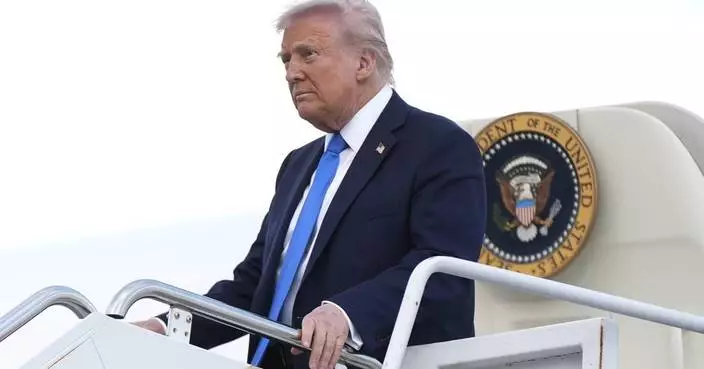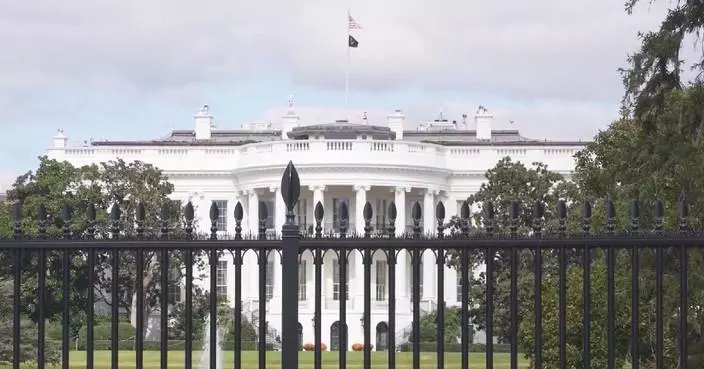BILLINGS, Mont. (AP) — President Donald Trump's nominee to oversee an agency that manages a quarter-billion acres of public land has withdrawn her nomination following revelations that she criticized the Republican president in 2021 for inciting the Jan. 6 attack on the U.S. Capitol.
The withdrawal of Kathleen Sgamma to lead the Interior Department's Bureau of Land Management was announced Thursday morning at the start of her confirmation hearing before the Senate Energy and Natural Resources Committee.
David Bernhardt, who served as interior secretary in Trump’s first term, suggested on X that Sgamma’s withdrawal was “self-inflicted” and he included a link to a website that posted her 2021 comments. Bernhardt indicated that people whose views don’t align with Trump’s should not seek political appointments in his administration.
“I am disgusted by the violence witnessed yesterday and President Trump’s role in spreading misinformation that incited it,” Sgamma said in the comments earlier reported by Documented, which describes itself as a watchdog journalism project.
Sgamma confirmed her withdrawal on LinkedIn and said it was an honor to have been nominated.
“I remain committed to President Trump and his unleashing American energy agenda and ensuring multiple-use access for all,” said Sgamma. Since 2006 she's been with the Denver-based Western Energy Alliance, an oil industry trade group, and has been a vocal critic of the energy policies of Democratic administrations.
White House spokesperson Liz Huston said the administration looked forward to naming another nominee but did not offer a timeline.
The longtime oil and gas industry representative appeared well-poised to carry out Trump's plans to roll back restrictions on energy development, including in Western states where the land bureau has vast holdings. The agency also oversees mining, grazing and recreation.
Sgamma's withdrawal underscored the Trump administration's creation of a “loyalty test” to weed out subordinates who are out of step with him, said Aaron Weiss, deputy director of the left-leaning Center for Western Priorities.
“That’s the world we're in — if that’s what happened — where being sane and acknowledging reality with the White House is enough to sink a nomination,” he said.
Trump has been testing how far Republicans are willing to go in supporting his supercharged “Make America Great Again” agenda. Few Republicans have criticized Trump after his sweeping pardons of supporters, including violent rioters, charged in the Jan. 6, 2021, attack on the Capitol.
Most congressional Republicans have played down the potential negative impact of Trump’s actions, including widespread tariffs on U.S. allies, and have stressed the importance of uniting behind him.
The Bureau of Land Management plays a central role in a long-running debate over the best use of government-owned lands, and its policies have swung sharply as control of the White House has shifted between Republicans and Democrats. Under President Joe Biden, a Democrat, it curbed oil drilling and coal mining on federal lands while expanding renewable power. The agency under Biden also moved to put conservation on more equal footing with oil drilling and other extractive industries in a bid to address climate change.
Trump is reversing the land bureau's course yet again.
On Thursday, officials announced that they will not comprehensively analyze environmental impacts from oil and gas leases on a combined 5,500 square miles (14,100 square kilometers) of bureau land in Colorado, Montana, New Mexico, North Dakota, South Dakota, Utah and Wyoming. The leases were sold to companies between 2015 and 2020 but have been tied up by legal challenges.
Also this week, Trump signed an executive order aimed at boosting coal production. That will end the Biden administration's ban on new federal coal sales on bureau lands in Wyoming and Montana, the nation's largest coal fields.
The land bureau had about 10,000 employees at the start of Trump’s second term, but at least 800 employees have been laid off or resigned amid efforts by the Trump administration to downsize the federal workforce.
It went four years without a confirmed director during Trump's first term. Trump moved the agency’s headquarters to Colorado before it was returned to Washington, D.C., under Biden.
Senate energy committee Chairman Mike Lee said he would work with the administration to find a new nominee for the bureau.
"Its work directly impacts millions of Americans — especially in the West — and its leadership matters," the Utah Republican said.
Utah officials last year launched a legal effort to wrest control of Bureau of Land Management property from the federal government and put it under state control. They were turned down by the U.S. Supreme Court.
Daly reported from Washington, D.C.
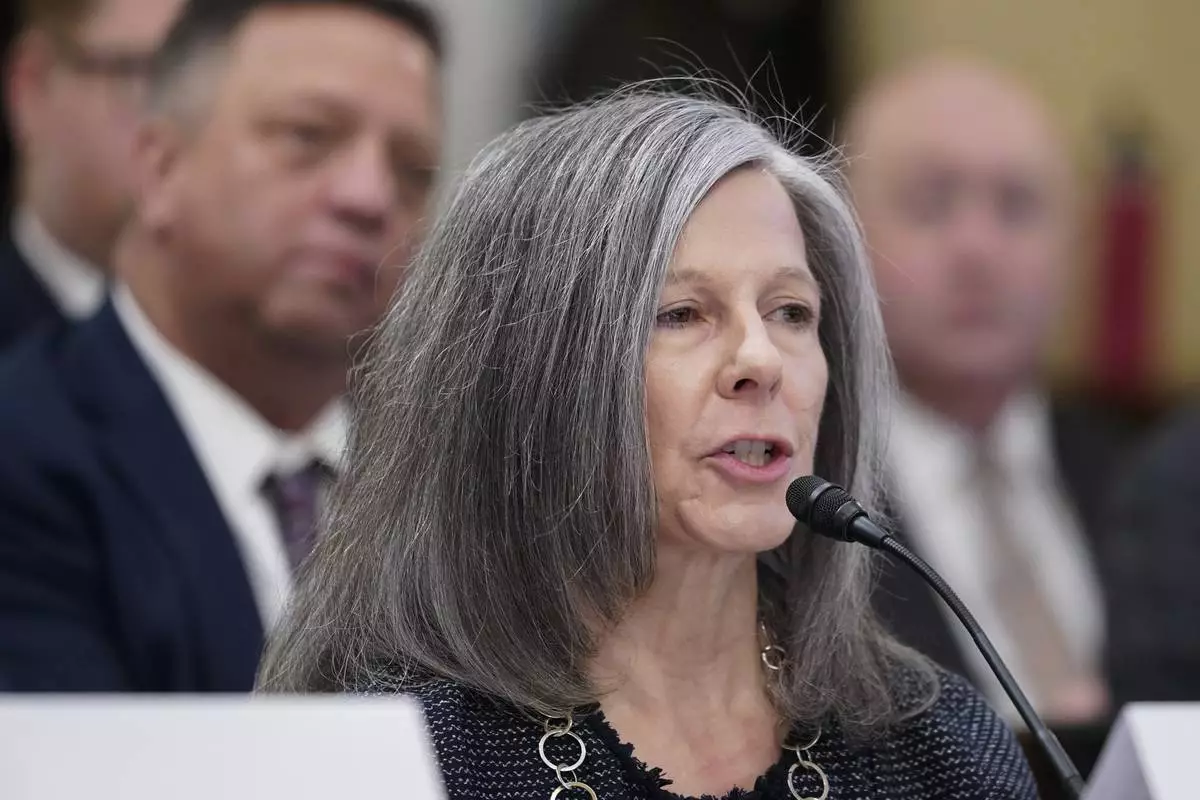
FILE - Kathleen Sgamma, President, Western Energy Alliance, speaks during a House Committee on Natural Resources hearing on America's Energy and Mineral potential, Feb. 8, 2023, on Capitol Hill in Washington. (AP Photo/Mariam Zuhaib, File)
WASHINGTON (AP) — The White House released President Donald Trump's 2026 budget proposal Friday, hoping to slash, if not zero out, spending on many government programs. It seeks a sweeping restructuring of the nation’s domestic priorities, reflective of the president’s first 100 days in office and sudden firing of federal workers.
Trump's plan aims for steep cuts to child care, disease research, renewable energy and peacekeeping abroad, many already underway through Elon Musk’s Department of Government Efficiency, all while pumping up billions for the administration's mass deportation agenda.
The budget drafters echo Trump’s promises to end “woke programs,” including preschool grants to states with diversity programs. And they reflect his vow to stop the “weaponization of government” by slashing the Internal Revenue Service, even as critics accuse him of using the levers of power to punish people and institutions he disfavors
Overall, it’s a sizable reduction in domestic accounts — some $163 billion, or 22.6% below current year spending, the White House said.
At the same time, the White House said it is relying on Congress to unleash $375 billion in new money for for the Homeland Security and Defense departments as part of Trump’s “big, beautiful bill” of tax cuts and spending reductions. His goal is to repel when he calls a “foreign invasion," though migrant arrivals to the U.S. are at all-time lows.
House Speaker Mike Johnson welcomed the proposal as “a bold blueprint that reflects the values of hardworking Americans and the commitment to American strength and prosperity.”
Budgets do not become law, but serve as a touchstone for the coming fiscal year debates. Often considered a statement of values, this first budget since Trump's return to the White House carries the added weight of defining the Republican president's second-term pursuits, alongside his party in Congress.
It comes as Trump has unilaterally imposed what could be hundreds of billions of dollars in tax increases in the form of tariffs, setting off a trade war that has consumers, CEOs and foreign leaders worried about a possible economic downturn.
Democrats assailed the budget as a devastating foreshadowing of Trump's vision for the country.
“President Trump has made his priorities clear as day: he wants to outright defund programs that help working Americans," said Sen. Patty Murray of Washington, the top Democrat on the Appropriations Committee. This, she said, “while he shovels massive tax breaks at billionaires like himself and raises taxes on middle-class Americans with his reckless tariffs.”
The White House Office of Management and Budget, headed by Russell Vought, a chief architect of Project 2025 from the conservative Heritage Foundation, provided contours of a so-called skinny version of topline numbers only.
It covers only the federal government's discretionary spending, now about $1.83 trillion a year on defense and nondefense accounts. Trump's team drops that spending by $163 billion, to $1.69 trillion, a portion of the nation's nearly $7 trillion budget that includes far more programs and services.
Federal budgets have been climbing steadily, as have annual deficits that are fast approaching $2 trillion with annual interest payments on the debt almost $1 trillion. That’s thanks mostly to the spike in emergency COVID-19 pandemic spending, changes in the tax code that reduced revenues and the climbing costs of Medicare, Medicaid and other programs, largely to cover health needs as people age. The nation’s debt load, at $36 trillion, is ballooning.
“We need a budget that tells the full story, and it should control spending, reduce borrowing, bring deficits down,” said Maya MacGuineas, president of the Committee for a Responsible Federal Budget, a fiscal watchdog group.
Among some of the White House's proposed highlights:
The State Department and international programs would lose 84% of their money and receive $9.6 billion, reflecting deep cuts already underway, including to the U.S. Agency for International Development.
The Health and Human Services Department would be cut by $33.3 billion and the Education Department’s spending would be reduced by $12 billion. The Centers for Disease Control and Prevention and the National Institutes of Health would all face steep reductions.
The Defense Department would get an additional $113.3 billion and Homeland Security would receive $42.3 billion more. Much of that is contingent on Congress approving Trump's big bill. That approach drew criticism from leading defense hawks, among them the former GOP Leader, Sen. Mitch McConnell of Kentucky.
McConnell called the proposed boost in defense money in the president's budget a “gimmick."
“America cannot expect our allies to heed calls for greater annual defense spending if we are unwilling to lead by example," McConnell said in a blistering statement. "Fortunately, Presidential budget requests are just that: requests. Congress will soon have an opportunity to ensure that American power – and the credibility of our commitments – are appropriately resourced."
It's Congress, under its constitutional powers, that decides the spending plans, approves the bills that authorize federal programs and funds them through the appropriations process. Often, that system breaks down, forcing lawmakers to pass stopgap spending bills to keep the government funded and avoid federal shutdowns.
Congress is already deep into the slog of drafting of Trump’s big bill of tax breaks, spending cuts and bolstered funds for the administration’s mass deportation effort — a package that, unlike the budget plan, would carry the force of law.
Vought is also expected on Capitol Hill in the weeks ahead as the Trump administration presses its case.
Among the more skilled conservative budget hands in Washington, Vought has charted a career toward this moment. He served during the first Trump administration in the same role and, for Project 2025, wrote an extensive chapter about the remaking of the federal government.
Vought has separately been preparing a $9 billion package that would gut current 2025 funding for the U.S. Agency for International Development and the Corporation for Public Broadcasting, which involves the Public Broadcasting Service and National Public Radio. Trump signed an executive order late Thursday that instructs the Corporation for Public Broadcasting and federal agencies to cease funding for PBS and NPR.
Vought has said that a package of so-called budget rescissions would be a first of potentially more, as the Trump administration tests the appetite in Congress for lawmakers to go on record and vote to roll back the money.
This story has been corrected to reflect that the administration is proposing to cut the Health and Human Services budget by $33.3 billion, not $33.3 trillion.
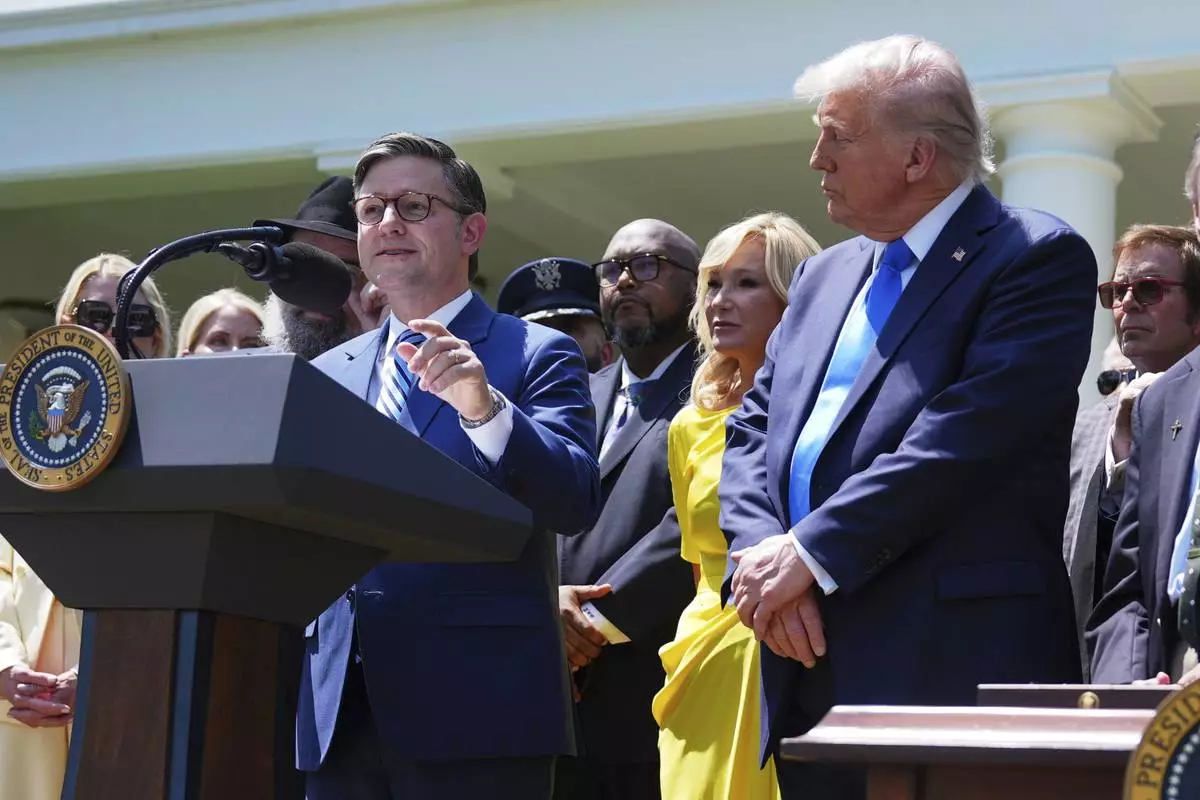
House Speaker Mike Johnson, R-La., speaks as President Donald Trump, right, listens during a National Day of Prayer event in the Rose Garden of the White House, Thursday, May 1, 2025, in Washington. (AP Photo/Evan Vucci)
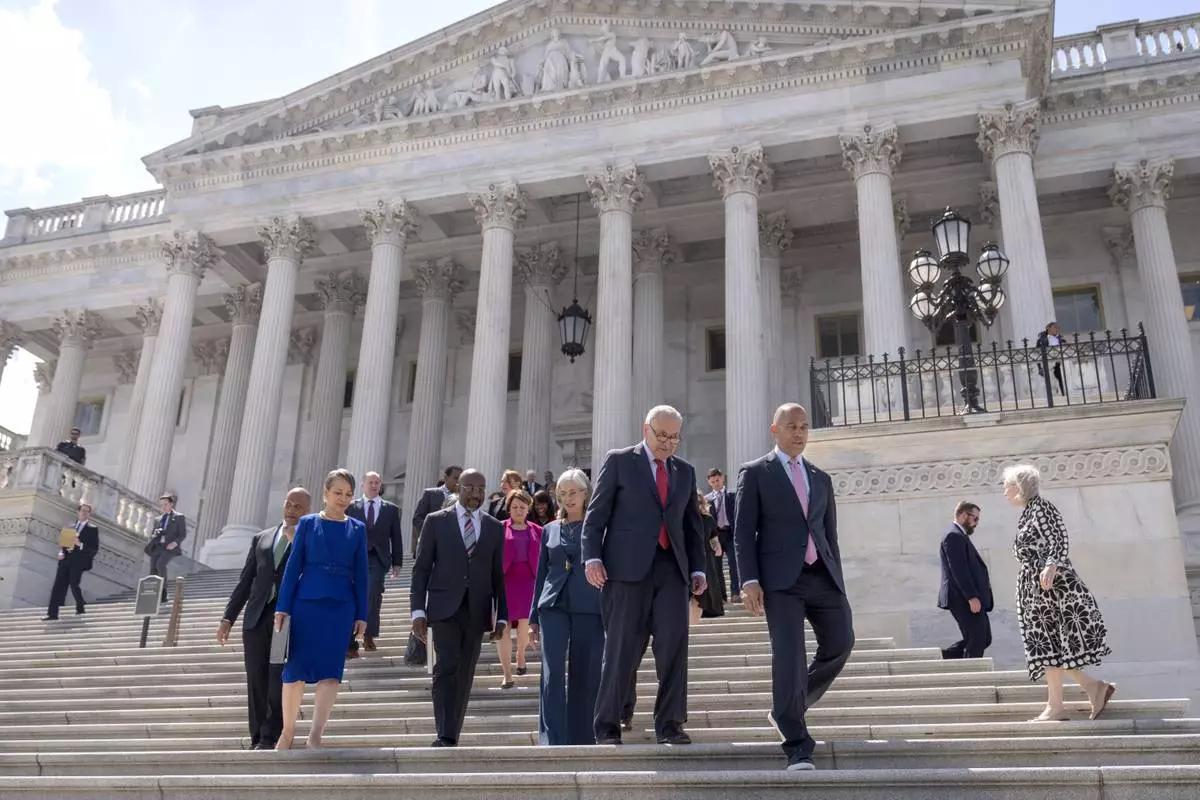
Senate Minority Leader Chuck Schumer, of N.Y., second from right, and House Minority Leader Hakeem Jeffries, of N.Y., right, arrive with other House and Senate Democrats for an event to mark 100 days of President Donald Trump's term on the steps of the Senate on Capitol Hill, Wednesday, April 30, 2025, in Washington. (AP Photo/Mark Schiefelbein)
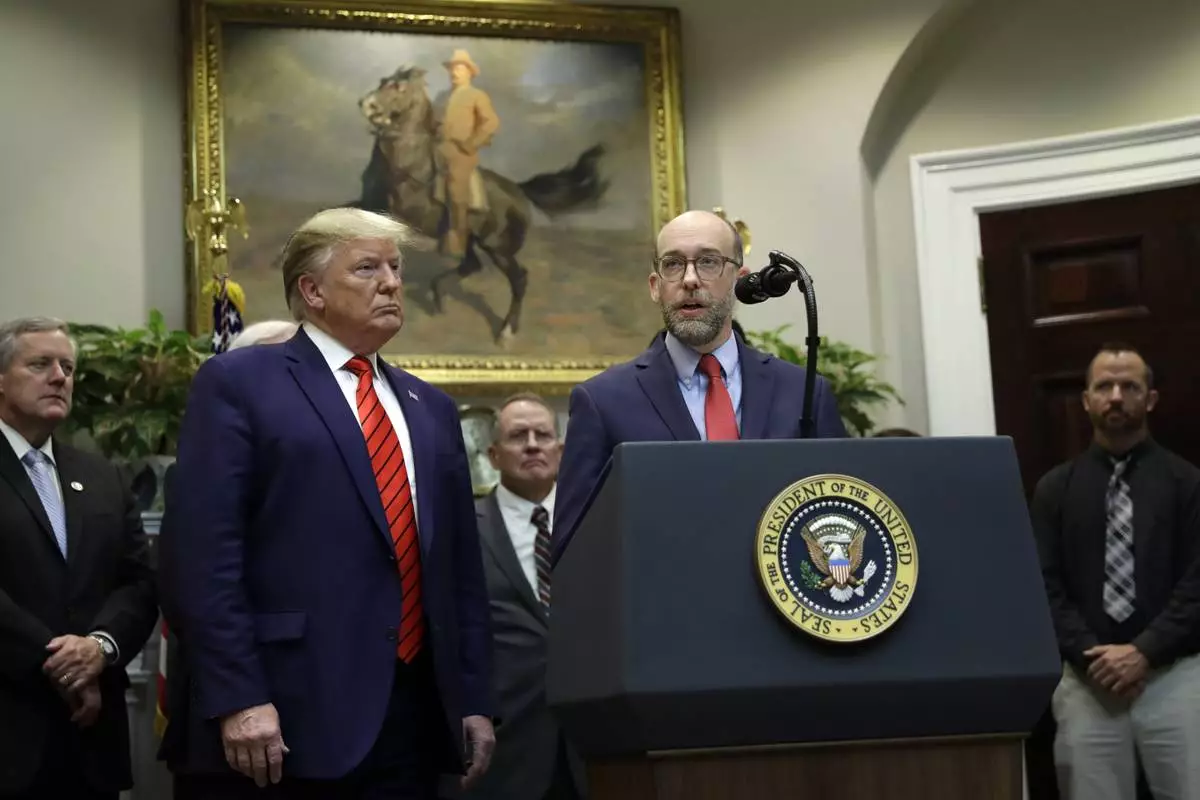
FILE - President Donald Trump listens as acting director of the Office of Management and Budget Russ Vought speaks during an event on "transparency in Federal guidance and enforcement" in the Roosevelt Room of the White House, Oct. 9, 2019, in Washington. (AP Photo/Evan Vucci, File)



